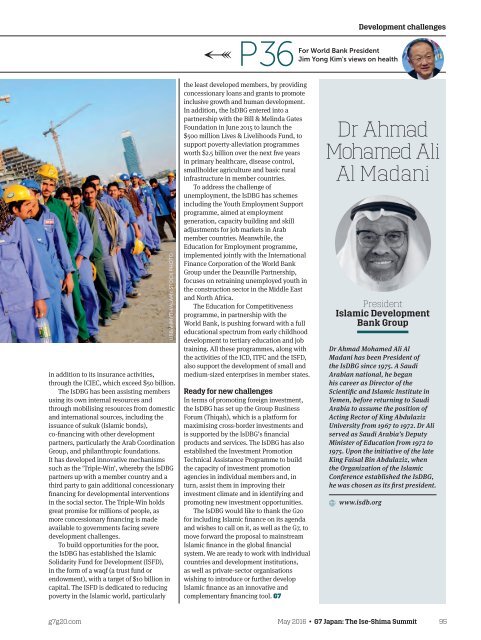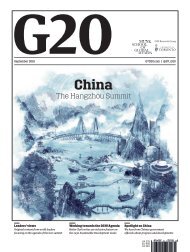G7_JAPAN
Create successful ePaper yourself
Turn your PDF publications into a flip-book with our unique Google optimized e-Paper software.
Development challenges<br />
For World Bank President<br />
P36Jim Yong Kim's views on health<br />
URBANMYTH/ALAMY STOCK PHOTO<br />
in addition to its insurance activities,<br />
through the ICIEC, which exceed $50 billion.<br />
The IsDBG has been assisting members<br />
using its own internal resources and<br />
through mobilising resources from domestic<br />
and international sources, including the<br />
issuance of sukuk (Islamic bonds),<br />
co-financing with other development<br />
partners, particularly the Arab Coordination<br />
Group, and philanthropic foundations.<br />
It has developed innovative mechanisms<br />
such as the ‘Triple-Win’, whereby the IsDBG<br />
partners up with a member country and a<br />
third party to gain additional concessionary<br />
financing for developmental interventions<br />
in the social sector. The Triple-Win holds<br />
great promise for millions of people, as<br />
more concessionary financing is made<br />
available to governments facing severe<br />
development challenges.<br />
To build opportunities for the poor,<br />
the IsDBG has established the Islamic<br />
Solidarity Fund for Development (ISFD),<br />
in the form of a waqf (a trust fund or<br />
endowment), with a target of $10 billion in<br />
capital. The ISFD is dedicated to reducing<br />
poverty in the Islamic world, particularly<br />
the least developed members, by providing<br />
concessionary loans and grants to promote<br />
inclusive growth and human development.<br />
In addition, the IsDBG entered into a<br />
partnership with the Bill & Melinda Gates<br />
Foundation in June 2015 to launch the<br />
$500 million Lives & Livelihoods Fund, to<br />
support poverty-alleviation programmes<br />
worth $2.5 billion over the next five years<br />
in primary healthcare, disease control,<br />
smallholder agriculture and basic rural<br />
infrastructure in member countries.<br />
To address the challenge of<br />
unemployment, the IsDBG has schemes<br />
including the Youth Employment Support<br />
programme, aimed at employment<br />
generation, capacity building and skill<br />
adjustments for job markets in Arab<br />
member countries. Meanwhile, the<br />
Education for Employment programme,<br />
implemented jointly with the International<br />
Finance Corporation of the World Bank<br />
Group under the Deauville Partnership,<br />
focuses on retraining unemployed youth in<br />
the construction sector in the Middle East<br />
and North Africa.<br />
The Education for Competitiveness<br />
programme, in partnership with the<br />
World Bank, is pushing forward with a full<br />
educational spectrum from early childhood<br />
development to tertiary education and job<br />
training. All these programmes, along with<br />
the activities of the ICD, ITFC and the ISFD,<br />
also support the development of small and<br />
medium-sized enterprises in member states.<br />
Ready for new challenges<br />
In terms of promoting foreign investment,<br />
the IsDBG has set up the Group Business<br />
Forum (Thiqah), which is a platform for<br />
maximising cross-border investments and<br />
is supported by the IsDBG’s financial<br />
products and services. The IsDBG has also<br />
established the Investment Promotion<br />
Technical Assistance Programme to build<br />
the capacity of investment promotion<br />
agencies in individual members and, in<br />
turn, assist them in improving their<br />
investment climate and in identifying and<br />
promoting new investment opportunities.<br />
The IsDBG would like to thank the G20<br />
for including Islamic finance on its agenda<br />
and wishes to call on it, as well as the <strong>G7</strong>, to<br />
move forward the proposal to mainstream<br />
Islamic finance in the global financial<br />
system. We are ready to work with individual<br />
countries and development institutions,<br />
as well as private-sector organisations<br />
wishing to introduce or further develop<br />
Islamic finance as an innovative and<br />
complementary financing tool. <strong>G7</strong><br />
Dr Ahmad<br />
Mohamed Ali<br />
Al Madani<br />
President<br />
Islamic Development<br />
Bank Group<br />
Dr Ahmad Mohamed Ali Al<br />
Madani has been President of<br />
the IsDBG since 1975. A Saudi<br />
Arabian national, he began<br />
his career as Director of the<br />
Scientific and Islamic Institute in<br />
Yemen, before returning to Saudi<br />
Arabia to assume the position of<br />
Acting Rector of King Abdulaziz<br />
University from 1967 to 1972. Dr Ali<br />
served as Saudi Arabia’s Deputy<br />
Minister of Education from 1972 to<br />
1975. Upon the initiative of the late<br />
King Faisal Bin Abdulaziz, when<br />
the Organization of the Islamic<br />
Conference established the IsDBG,<br />
he was chosen as its first president.<br />
www.isdb.org<br />
g7g20.com May 2016 • <strong>G7</strong> Japan: The Ise-Shima Summit 95
















